|
|
|
Sort Order |
|
|
|
Items / Page
|
|
|
|
|
|
|
| Srl | Item |
| 1 |
ID:
134351
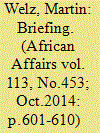

|
|
|
|
|
| Summary/Abstract |
ACADEMIC ANALYSES OF THE PROLONGED CRISIS in the Central African Republic (CAR) and the international response to it are rare. This masks the depth of the crisis. The most recent outbreak of conflict alone, following a coup d'état staged by the Séléka rebels in March 2013, left countless civilians dead,1 more than half a million people displaced, and over half of the 4.6 million population in immediate need of aid.2 Several regional and international organizations, including the African Union (AU), the Economic Community of Central African States (ECCAS), the European Union (EU), and the United Nations (UN), became involved in the process of crisis solution, with all of the organizations deploying troops to the CAR. Their efforts have thus far born limited results; fighting and human suffering continue.
|
|
|
|
|
|
|
|
|
|
|
|
|
|
|
|
| 2 |
ID:
158302
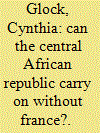

|
|
|
|
|
| Summary/Abstract |
The Central African Republic (CAR) has a long history of internal instability and conflict, which has usually been resolved through French military intervention. These issues resurface generally when political and economic difficulties re-emerge, creating a circle of conflict and intervention in which both countries have been involved for decades. Cynthia Glock takes stock of the current situation and its historical context, and asks how long the CAR and France will continue to be bound by this dynamic.
|
|
|
|
|
|
|
|
|
|
|
|
|
|
|
|
| 3 |
ID:
129324
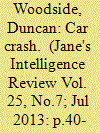

|
|
|
| 4 |
ID:
129113
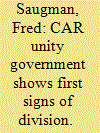

|
|
|
| 5 |
ID:
184968
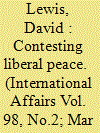

|
|
|
|
|
| Summary/Abstract |
Russia has begun to promote itself internationally as a mediator of conflict and as a ‘peacemaker’. Russian officials cite its extensive experience in managing numerous post-Soviet conflicts and its more recent experience of intervention in civil wars in Syria, Libya, the Central African Republic (CAR) and Nagorno-Karabakh. Russia considers all these activities forms of ‘peacemaking’, but its approach differs radically from the model of liberal peacebuilding that has dominated international practice in the post-Cold War era. It prioritizes authoritarian stability over justice, human rights and democracy and advocates short-term goals of conflict management over long-term goals of conflict resolution. In this article I explain why Russia's norms of peacemaking and conflict management diverged so markedly from liberal peacebuilding norms. I argue that Russia is no longer simply contesting western norms, but developing its own distinct model of conflict management. This model accepts the use of force as an integral element in peacemaking, engages in ‘coercive’ mediation by authoritative actors, and views the West as a geopolitical and normative opponent. This debate over Russia's approach to peace and conflict also offers wider insights into how Russia challenges the norms and practices that underpin the liberal international order.
|
|
|
|
|
|
|
|
|
|
|
|
|
|
|
|
| 6 |
ID:
155692
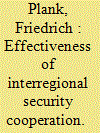

|
|
|
|
|
| Summary/Abstract |
African Union (AU)–European Union (EU) interregional security cooperation has not so far been analysed systematically with regard to its effectiveness despite the substantial support of African capacity building by the EU and joint peacekeeping of the partners. Assessing AU–EU cooperation in the Central African Republic (CAR), this paper examines to what extent and under which conditions EU–AU efforts are effective. Concerning the dependent variable, the presented conceptualisation of effectiveness includes both internal (goal attainment) and external (problem-solving) perspectives. The independent variable draws on two strands of literature that barely speak to each other: interregionalism and inter-organisationalism. It focuses on the conditions of effectiveness which include both internal (RO-specific) and interregional factors. The findings suggest that AU–EU engagement in the CAR was effective in the medium term. Strong incentives of the partners, the French leading role and the convergence of the partners are identified as factors conducive to a medium to high effectiveness of the engagement.
|
|
|
|
|
|
|
|
|
|
|
|
|
|
|
|
| 7 |
ID:
085670
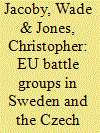

|
|
|
|
|
| Publication |
2008.
|
| Summary/Abstract |
This article fills an important empirical gap concerning a key building block of the EU's Headline Goal 2010, the EU Battlegroups. It asks whether the Battlegroup concept has been robust enough to drive significant changes in two smaller EU member state militaries. We find that it has, though with important qualifications, in the Swedish case, but much less in the Czech case. We stress the importance of linkages between the Battlegroup concept and the prevailing defense reform ideas in each state. We argue that Battlegroup deployment would lead to even greater transformation but that European leaders currently have not faced powerful incentives to deploy the kinds of precise assets the Battlegroups provide. The article also addresses both the fiscal priorities that hamper military readiness and delay deployments and the substantial and enduring gap between word and deed for which EU military efforts have become known.
|
|
|
|
|
|
|
|
|
|
|
|
|
|
|
|
| 8 |
ID:
085768
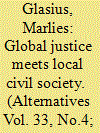

|
|
|
|
|
| Publication |
2008.
|
| Summary/Abstract |
As a new justice institution, the International Criminal Court (ICC) needs to gain legitimacy not just with states but also in civil society, both at the global level and in the societies in which it intervenes. This article, based on interviews, NGO documents, newspaper articles, and participatory observation, looks at civil-society relations with the ICC in relation to its most recent and least publicized investigation-that in the Central African Republic (CAR). It charts the role of civil-society organizations, local and international, in the opening of the investigation, and it discusses the initial responses to the investigation of civil-society figures and victims in the CAR. It finds that unlike in any of the other situations, the ICC's involvement in the CAR has been largely instigated by local civil-society figures and that, as a result, it operates in a quite receptive context. However, the slow pace of investigations and trials, the meager outreach to date, and the court's probable lack of capacity to provide victims with physical and material security are long-term challenges for its ability to meet local expectations of justice.
|
|
|
|
|
|
|
|
|
|
|
|
|
|
|
|
| 9 |
ID:
177855
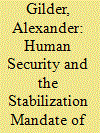

|
|
|
|
|
| Summary/Abstract |
This article looks narrowly at whether a ‘human security’ approach can be seen in a UN peace operation that pursues stabilization, namely the United Nations Multidimensional Integrated Stabilization Mission in the Central African Republic (MINUSCA). The UN’s interpretation of stabilization has not been expressly set out, but stabilization missions typically work alongside the host state to extend state authority and use robust force to counter spoilers. Human security is a concept which is rights-based, promotes the ‘vital core’, has a concern for vulnerability, utilizes preventative protection methods, and empowers local persons to have agency in the peace process. Attempts have been made to institutionalize and mainstream human security practices within the UN. An analytical framework of human security is outlined in this article and used to assess to what extent the mandate of MINUSCA pursues human security-based goals. An extensive review of UN documentation looks at the mandate and practice of MINUSCA and it is argued that the mission does seek to empower local people, engage in a bottom-up manner and entrench the rule of law. The analytical framework also casts light on aspects of the stabilization mandate which are problematic such as militarization and cooperation with the host state.
|
|
|
|
|
|
|
|
|
|
|
|
|
|
|
|
| 10 |
ID:
134357
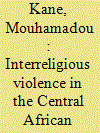

|
|
|
|
|
| Summary/Abstract |
The outbreak of violence following the insurgency by a coalition of armed groups called Séléka represents one of the darkest pages in the contemporary history of the Central African Republic (CAR). Although the country has experienced chronic instability since independence from France in 1960, it has never before descended into the current near-genocidal situation, which has pitted Muslims against Christians. The CAR has been embroiled in conflict since March 2013, with unprecedented security and humanitarian consequences. In December 2013, the United Nations representative for the first time described the situation as an alarming security threat and evoked the likelihood of genocide and humanitarian disaster if nothing is done.
|
|
|
|
|
|
|
|
|
|
|
|
|
|
|
|
| 11 |
ID:
154381
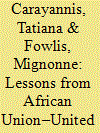

|
|
|
|
|
| Summary/Abstract |
Having hosted nearly a dozen peacekeeping and peacebuilding efforts since the mid-1990s, the Central African Republic (CAR) has been a laboratory for peace interventions – an ‘early adopter’ of various peace initiatives. It is thus a useful case from which to draw preliminary conclusions about the roles of the United Nations (UN) and regional organisations in resolving conflicts that involve entire regions. This article examines the roles of the UN and the African Union (AU) in CAR, where there is a long history of successive conflict resolution efforts that have been overseen by the international community and the region alternatively. The AU, regional economic communities (RECs) such as the Economic Community of Central African States (ECCAS), and regional leaders have also played important roles during the many initiatives aimed at resolving conflict in CAR. This article analyses the responses and relationship between these institutions and actors, beginning with the deployment of an inter-African monitoring mission in 1997. It is argued that peace operations in CAR have lacked a clear political strategy and a clear understanding of the situation, as well as the necessary sustained engagement from both regional and international actors. It is further argued that each subsequent intervention has added an additional layer to the previous one, thus creating a proliferation of peace operations whose mandates, troop contingents and leadership have not always been fit for purpose.
|
|
|
|
|
|
|
|
|
|
|
|
|
|
|
|
| 12 |
ID:
165975
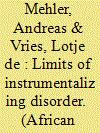

|
|
|
|
|
| Summary/Abstract |
Assumptions about the political economy of African states predominantly centre on a dominant elite’s ability to stabilize power. A key assertion is that elites maintain clientelistic networks of rents and redistribution and in turn extend their control over their respective territories by instrumentalizing disorder. We challenge the assumption that disorder plays such a functional role. Largely drawing on data and fieldwork from the Central African Republic, we demonstrate the profoundly unproductive consequences of disorder that tend to be overlooked through current approaches to the political economy of African countries. We investigate how disorder impacts three dimensions of effective politics of domination: a set of elite groups that structure power in society, a political economy that redistributes its benefits through formal and informal networks, and the existence of functional centre–periphery ties across a territory. The article shows with regard to the Central African Republic that disorder has produced a small political elite that is largely unable to stabilize its power basis. We argue that certain African states are subject to forms of disorder that political elites cannot turn into an advantage.
|
|
|
|
|
|
|
|
|
|
|
|
|
|
|
|
| 13 |
ID:
099178
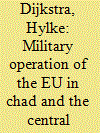

|
|
|
|
|
| Publication |
2010.
|
| Summary/Abstract |
This article evaluates the military operation of the European Union in Chad and the Central African Republic in 2008-09. Despite a promising conceptual approach and close cooperation with the United Nations (UN), the operation created significant political problems between member states. It led to a split - France arguing that it carried too much of the burden and Germany and the United Kingdom sensing that they were sponsoring a pet project. When the UN failed to achieve its ambitious promises to establish a parallel presence and follow-on force, tensions arose with the UN as well. This type of operation is therefore unlikely to be repeated in the near future.
|
|
|
|
|
|
|
|
|
|
|
|
|
|
|
|
| 14 |
ID:
145596
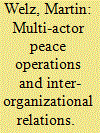

|
|
|
|
|
| Summary/Abstract |
Multi-actor peace operations have become the dominant mode of peace operations since the end of the cold war. This article uses the literature on institutional linkages and inter-organizational relations, thus far developed independently from the literature on such operations, to shed light on the relations between the organizations involved in them. The analysis of one specific case – the interactions between the United Nations, the African Union, the Economic Community of Central African States and the European Union in the Central African Republic – shows the usefulness of merging this body of theory with the primarily empirically driven research on peace operations and UN–regional collaboration. The findings of this study are meant to facilitate further research on multi-actor peace operations and serve as a building block for a theory explaining the emergence and configuration of such operations.
|
|
|
|
|
|
|
|
|
|
|
|
|
|
|
|
| 15 |
ID:
184094
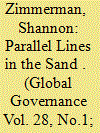

|
|
|
|
|
| Summary/Abstract |
UN peace operations are often accompanied by parallel forces from individual states, regional organizations, or “coalitions of the willing.” These forces remain distinct from the UN to address security concerns outside the remit of traditional peacekeeping. The deployment of UN stabilization operations, however, has resulted in an overlap between UN and parallel forces. This article investigates the complex relationships between UN stabilization operations and parallel forces using as examples the French and UN deployments in Mali and the Central African Republic. It concludes that when UN and parallel forces have distinct mandates, they often create military synergies but political tensions. In particular, when peacekeepers are reliant on parallel forces for military support, the UN can struggle to achieve its longer-term political tasks. When parallel forces are explicitly mandated to support UN efforts, the UN is better able to leverage its relationship with parallel forces to achieve its military and political objectives.
|
|
|
|
|
|
|
|
|
|
|
|
|
|
|
|
| 16 |
ID:
187340
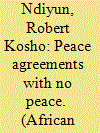

|
|
|
|
|
| Summary/Abstract |
Societies faced with authoritarian rule or conflict usually adopt different paths to peace. The course adopted by each community to guarantee stability determines the extent to which the sustainability of the peace can be assured. Every attempt to pacify a society should aim to prevent a relapse to conflict or authoritarian rule while considering the damage caused and sorting out measures to repair the harm. The history of military coups and conflicts in the Central African Republic (CAR) is well documented. Still, the attempted remedies have greatly side-lined the raison d’être of the responses in guaranteeing peace and preventing relapse to conflict. As the CAR remains politically and socially unstable, an analysis of the failure of peace agreements to ensure stability constitutes a field of inquiry that urgently necessitates a more profound investigation to save the country from recurrent hostilities and guarantee a peaceful society for the citizens. Peace includes an aspiration manifested by both the CAR authorities and non-state armed groups in the course of hostilities and on the negotiation table. Central Africans indicate an interest in peace, but such interest often manifested and materialised in peace agreements has barely been implemented.
|
|
|
|
|
|
|
|
|
|
|
|
|
|
|
|
| 17 |
ID:
189349
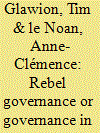

|
|
|
|
|
| Summary/Abstract |
Rebel governance assumes a symbiotic relationship between coercion and public goods provision. However, in the rebel-held town of Ndélé, Central African Republic, we find that governance happens in rebel-held territory, but rarely by rebels. Rebels allowed other actors to provide services for the people only when this did not hinder rebels extracting political clout and economic benefit from the people and their lands. We show how rebels’ extractive ambitions and governance discourses evolved during successive stages of rebellion through a diachronic comparison rooted in multimethod fieldwork from 2018 to 2022. We ask, why were rebel groups able to set up their rule, then rule for seven years, before ultimately losing power? Rebels evoked public goods at the onset of rebellion to justify the use of coercive means. After rebel rule was established, rebels outsourced public goods to international and state actors allowing for governance in rebel-held territory while focussing their own efforts on extraction. When their rule was challenged, rebels targeted governance actors and spaces in their territory in pursuit of economic gain and political dominance. Our findings call for a re-evaluation of existing rebel governance studies and the ways in which rebel groups are engaged with.
|
|
|
|
|
|
|
|
|
|
|
|
|
|
|
|
| 18 |
ID:
129212
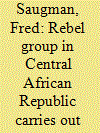

|
|
|
| 19 |
ID:
102401
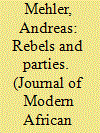

|
|
|
|
|
| Publication |
2011.
|
| Summary/Abstract |
This paper analyses the declining importance of political parties in the Central African Republic (CAR). The country can be considered an extreme example of the lack of viability of a state in general, and democracy in particular. However, the quality of elections has exceeded the average in the sub-region over a substantial time-span. Hopes for a democratic future only faded in recent years. The paper hypothesises that both political parties and rebel movements are failing to adequately represent (ethnoregional) interests, but that parties are suffering more in the course of the enduring war and the peace process. Patterns of elite behaviour are presented as the main explanation for the resulting crisis of representation, with international actors' preference for inclusionary power-sharing deals seen as the main aggravating factor.
|
|
|
|
|
|
|
|
|
|
|
|
|
|
|
|
| 20 |
ID:
160680
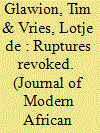

|
|
|
|
|
| Summary/Abstract |
The Central African Republic experienced unprecedented violence between 2012 and 2014. We analyse three recent ruptures that developed as a result of this crisis, suggesting a break with the country's past. First, the Séléka rebellion that started in 2012; second, the establishment of a robust UN Peacekeeping mission in 2014; and finally, the democratic election of a civilian president in 2016. However, three deep-rooted patterns of governance have in each case transformed these ruptures. A history of outsourced politics, a plurality of violence and peripheral neglect push actors to perpetuate the violent past rather than breaking with it. We conclude that after an initial attempt to break with the CAR's long-term political economic trends, rebel groups, the UN mission and the democratic government have backtracked and now risk reinforcing the violence that mark politics and everyday life in the country.
|
|
|
|
|
|
|
|
|
|
|
|
|
|
|
|
|
|
|
|
|